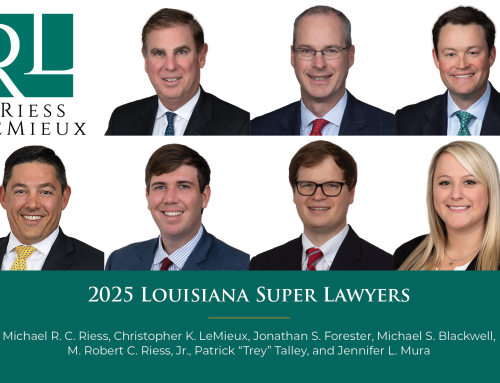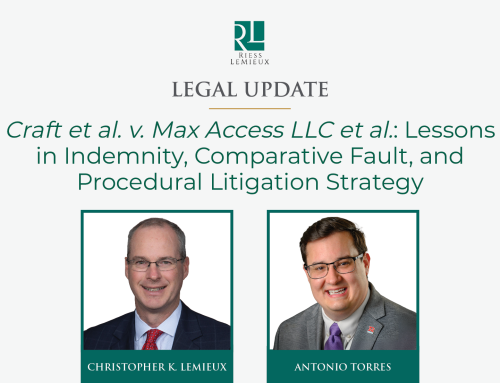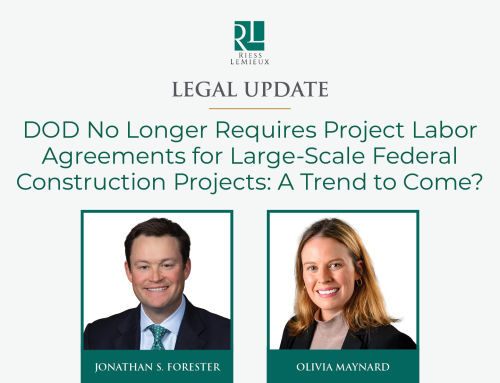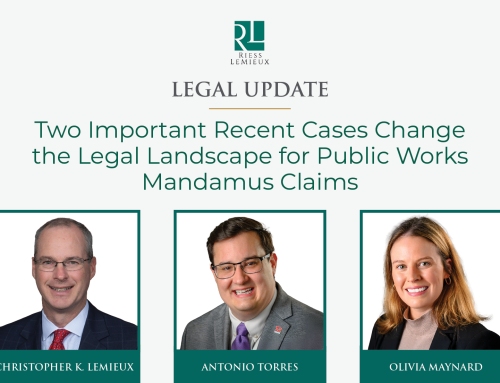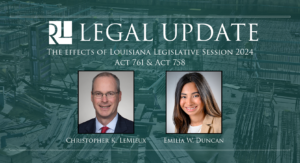 Overturning Glencoe v. Clerk of Court & Bear Industries v. Hanover: The effects of Louisiana Legislative Session 2024 Act 761 & Act 758.
Overturning Glencoe v. Clerk of Court & Bear Industries v. Hanover: The effects of Louisiana Legislative Session 2024 Act 761 & Act 758.
Authors: Christopher K. LeMieux and Emilia W. Duncan
With the 2024 Louisiana Legislative session coming to an end this past June, the Legislature enacted two significant Acts regarding the Public Works Act located in La. R.S. Title 38, the Private Works Act located in La. R.S. Title 9, and its corresponding relationship to sureties issuing payment bonds for construction projects. Specifically, recently passed Senate Bill 265, now known as Act 761, pertains to liability of sureties issuing payment bonds for construction projects covered by the Public Works Act. While Senate Bill 131, now known as Act 758, deals with the liability of sureties issuing payment bonds for construction projects covered under the Private Works Act.
The recent enactment of both Act 761 and Act 758 legislatively overturn Glencoe v. Clerk of Court and Bear Industries v. Hanover, by now allowing a surety issuing a payment bond for a construction project, either covered by the Public Works Act or Private Works Act, to assert any defense to the principal obligation that its principal could assert, with the exceptions of lack of capacity or discharge in bankruptcy of the principal obligor. These changes in recent legislation now coincide with the general principles of suretyship.
Glencoe v. Clerk of Court
In January 2007, the Glencoe Education Foundation, d/b/a Virgil Brown Glencoe Charter School (“Glencoe”/ “Owner”) contracted with Lamar Contractors, Inc. (“Lamar”), as the general contractor under the Public Works Act for the construction of a new building at Glencoe’s charter school in Franklin, Louisiana (the “Project”). In connection with the Project, Hartford Casualty Insurance Company (“Hartford”/ “Surety”) issued a performance bond and payment bond to Lamar, each in the amount of $3,178,000.00.
Lamar then subcontracted with Brown Drywall & Coating, Inc. (“Brown”) to furnish all materials and labor to install and complete painting system on the Project, for a lump sum price of $124,420.00. Lamar also subcontracted with Mayeux’s Air Conditioning & Heating, Inc. (“Mayeux’s”) to provide all materials and labor for the installation of a HVAC system, for a lump sum price of $214,827.00. It is undisputed that both subcontractors, Brown and Mayeux’s, satisfactorily performed the duties of their respective subcontracts on the Project.
However, during the Project, a dispute arose between Glencoe and Lamar, which ultimately lead to Glencoe withholding payment of the remaining balance owed to Lamar. In response, Lamar filed a lien against Glencoe in the mortgage records for $380,850.19 for the remaining balance due on the Project. Subcontractors, Brown and Mayeux’s, each also filed their own respective lien against Glencoe as well as against Lamar and Hartford, for the remaining balance due and owed for finished work on the Project. Brown’s lien was for the amount of $52,339.73 and Mayeux’s lien was for the amount of $30,420.00.
Glencoe, in response to the multiple liens filed against it, sought to cancel the recorded liens on the basis that there was a payment bond in effect for the Project. Brown then filed a claim against the payment bond, alleging that an amicable demand for payment had been made to the principal and surety, and no payment has been made. Brown also filed a reconventional demand against Glencoe and a third-party demand against Lamar and Hartford for the remaining unpaid balance. Mayeux’s did the same by filing its own claim against Lamar and Hartford for the remaining unpaid balance.
The trial court dismissed all claims against Glencoe with prejudice and directed the clerk of court to cancel all liens filed against Glencoe. Thereafter, Brown filed a motion to set summary hearing and trial of all the remaining issues and claims pending. Lamar and Hartford opposed and argued that none of the subcontractors were entitled to recover any amount from them due to the “pay if paid” provisions in the subcontracts. The provisions provided, “The Contractor shall not be obligated to make any payment to the Subcontractor under this contract unless and until General Contractor from the Owner receives payment.” Therefore, pursuant to the terms of the subcontracts, since Glencoe had not paid Lamar for its remaining balance owed for the work performed on the Project, Lamar was not obligated to make any payments to its subcontractors for the remaining balance owed to the subcontractors.
Hartford, as the surety, argued the same, urging that it was also entitled to the benefit of the “pay of paid” provision. In support, Hartford relied heavily on the law of suretyship. Specifically, it relied on two fundamental principles:
- a surety cannot be bound to an obligee to any greater extent than the obligation contained in the agreement between the obligor and the oblige; and
- a surety may assert any defense to the principal obligation against the creditor that the principal could assert except the lack of capacity or discharge in bankruptcy.
At trial, the court ultimately dismissed Brown and Mayeux’s claims against Lamar as premature due to the “pay if paid” provision in the subcontracts. However, the court did not agree with Hartford’s argument that it was also entitled to rely upon the “pay-if-paid” provisions and entered a judgment in favor of Brown and Mayeux’s against Hartford for the amounts owed.
Hartford appealed the trial court’s decision, arguing that the trial court erred in finding Hartford obligated to pay any amounts to the subcontractors, in awarding attorney fees to Brown and Mayeux’s, and in assessing Hartford with all costs of the concursus proceeding. On appeal, the First Circuit agreed with the trial court and affirmed the judgments in favor of Brown and Mayeux’s against Hartford.
How Act 761 addresses the issues in Glencoe v. Clerk of Court
The main issue presented to the trial court and on appeal in Glencoe was whether a surety, which had issued a statutory bond governed by the provisions of the Public Works Act, may rely on a “pay if paid” provision in its principal’s subcontract as defense to payment of sums owed to subcontractors who have performed work and supplied materials on public construction Project. In other words, whether a surety, which provided a bond for a public works contract, is entitled to assert the same defenses as the principal against a creditor.
Generally, under the law of suretyship, Hartford’s argument was correct. However, the trial court and First Circuit thought otherwise, given the purposes of the Public and Private Works Acts to pay laborers and materialmen. Now, almost 13 years later, the Legislature’s enactment of Act 761 intends to clear up the issue for sureties and is more in line with general laws of suretyship.
Under Act 761, Sureties, who issue bonds for public works contracts, are now allowed to assert any defenses to principal obligations that its principal could assert, with the exception of lack of capacity and discharge in bankruptcy, against a creditor. The new act completely overturns the previous ruling in Glencoe and the rulings that subsequently followed. The enactment of Act 761 is a huge win for sureties who provide bonds for public contracts in Louisiana, as the law now protects sureties from obligations under which they would normally not be liable pursuant to the general laws of suretyship.
Act 758 and Bear v. Hanover
Under Act 758, the legislature provides those same protections, as in Act 761, for sureties who provide bonds for projects governed by the Private Works Act located in La. R.S. Title 9. The Legislature, in its enactment of Act 758, intends to clear up similar issues in Bear Industries v. Hanover, regarding defenses of principals afforded to a surety for principal obligations against a creditor.
Similarly to Glencoe, Bear Industries v. Hanover dealt with the same surety issue, with the difference being that the bonds at issue were provided for a private works contract. Just like Glencoe, the trial court in Bear Industries v. Hanover, determined that the general principles of suretyship law did not control the determination of the surety’s liability on the bond. The trial court reasoned that the bond provided for by the Private Works Act was a statutory bond entitled to the same status as a bond furnished under the Public Works Act, and that the main provision required of the bond by the Private Works Act was that it provided solvent security for the payment of workmen and furnishers of materials on the project. The trial court in its determination even cited Glencoe as an example.
Once again, the First Circuit agreed with the trial court’s ruling and affirmed the judgment against the surety. The First Circuit reasoned that,
Allowing a surety to assert a “pay if paid” clause to defeat payment to a subcontractor on the basis that the contractor has not received full payment from the owner, where the owner has escaped liability to the subcontractors by relying on payment bond, would render protections afforded to laborers and suppliers on private works projects set forth in the Private Works Act meaningless.
The Legislature agreed with the arguments put forth by the surety in Bear Industries, relying on the general principles of suretyship law. Pursuant to Act 758, Sureties who issue bonds for private works contracts will be allowed to assert any defenses to principal obligations that its principal could assert, with the exception of lack of capacity and discharge in bankruptcy, against a creditor. The new act completely overturns the previous ruling in Bear Industries and the rulings that subsequently followed.
This is a significant benefit to sureties (and the principles to which they provide bonds) in Louisiana, as the enactment of Acts 761 & Act 758 change the previous statutes under the Public Works Act and Private Works Act to now align with the normal protections afforded to sureties under the general laws of suretyship.
